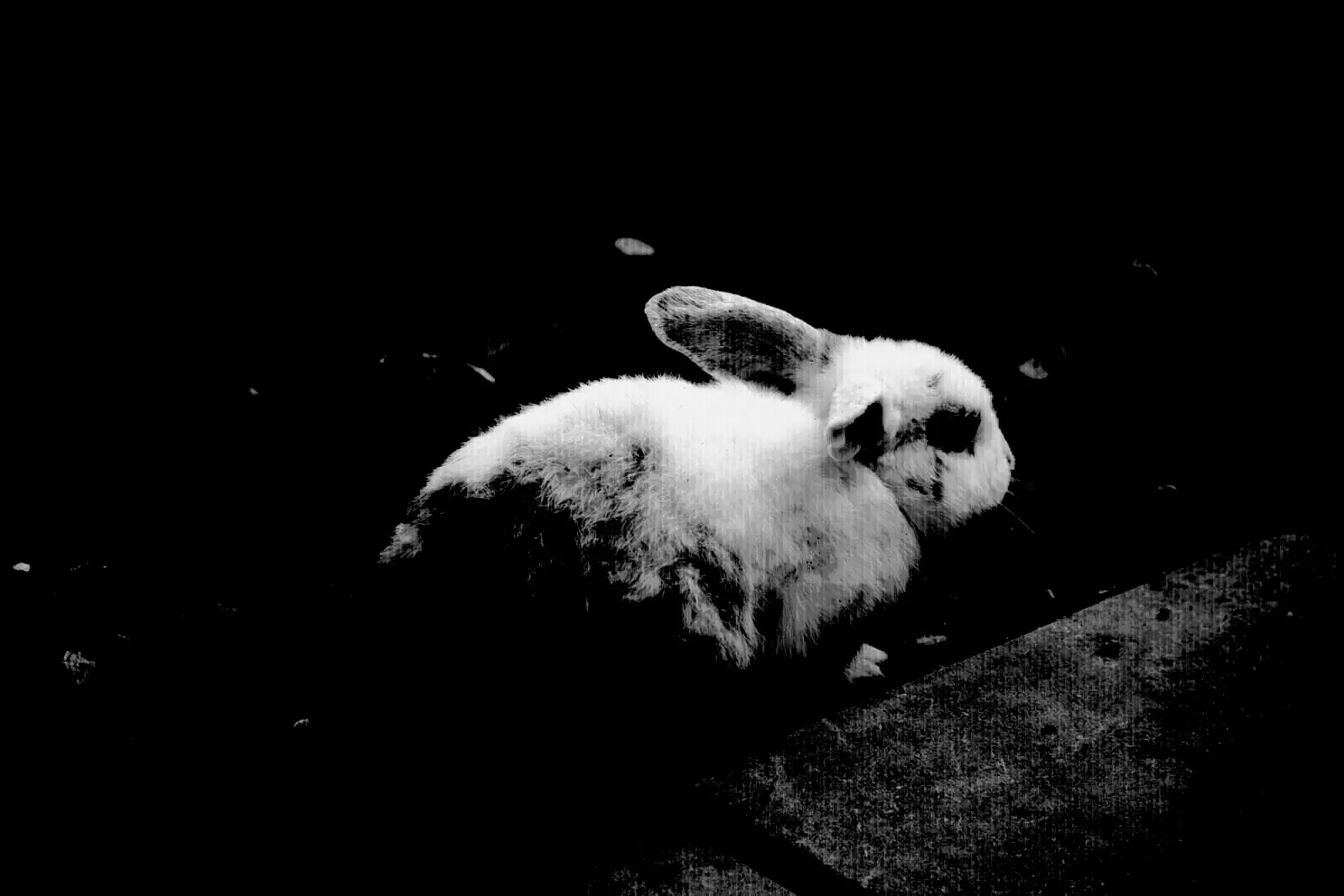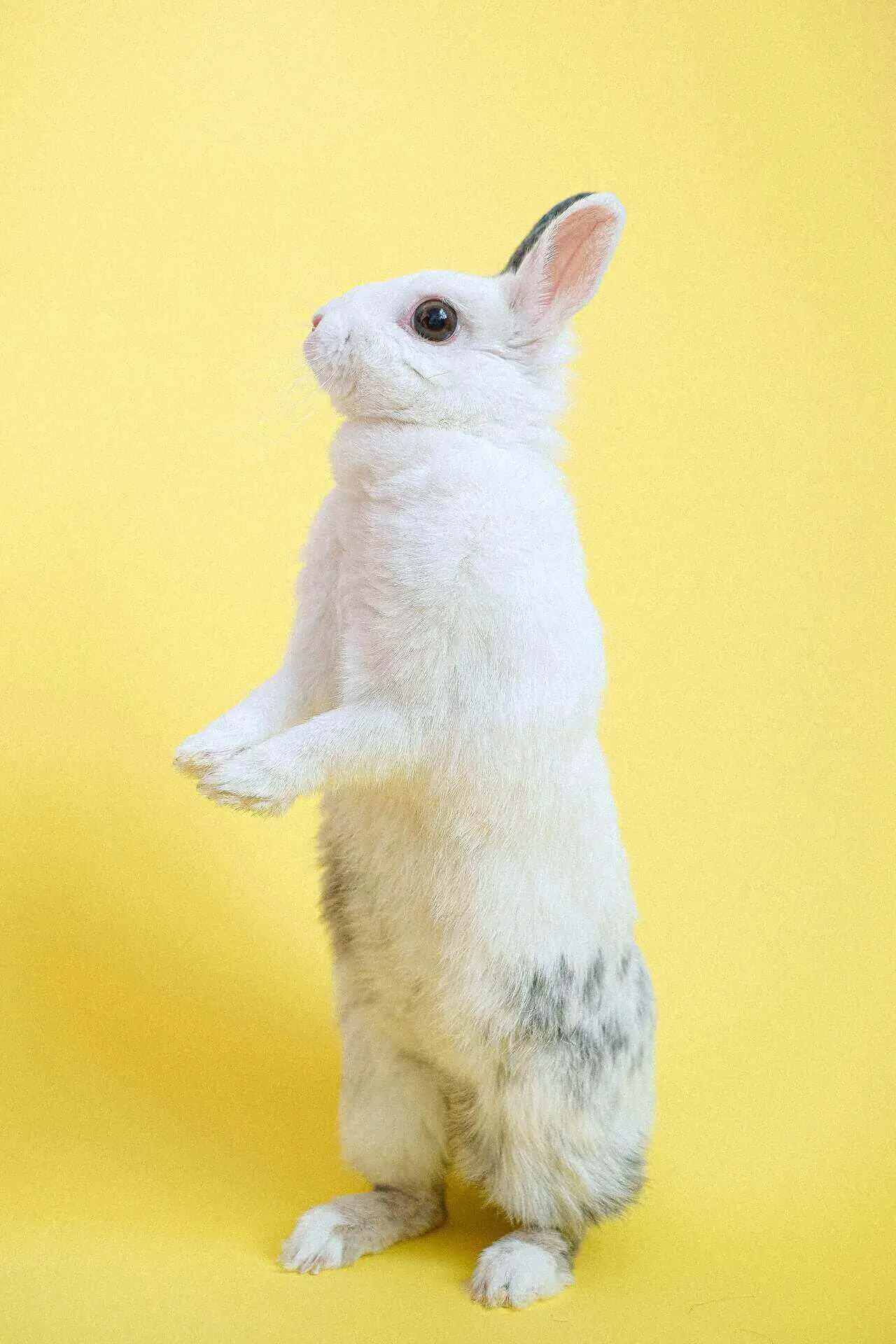People often express interest in knowing if rabbit urine is harmful to humans. In this article, you will find information on whether rabbit urine is harmful to humans – and if yes, how exactly it can be harmful.
Is rabbit urine harmful to humans? For healthy humans whose immunity is functioning properly, contact with rabbit urine is largely not harmful. But for humans with compromised immunities, exposure to rabbit urine can lead to conditions like Encephalitozoon cuniculi (E. cuniculi) infection.
Of course, if bunny pee gets into contact with human food, there can be bad contamination. Bacteria and other pathogens that may be in the rabbit pee can make the people who eat such contaminated food sick.
It is also worth noting that rabbit urine tends to have very much ammonia. This often leads people to ask, can you get sick from the ammonia in your rabbit’s urine?
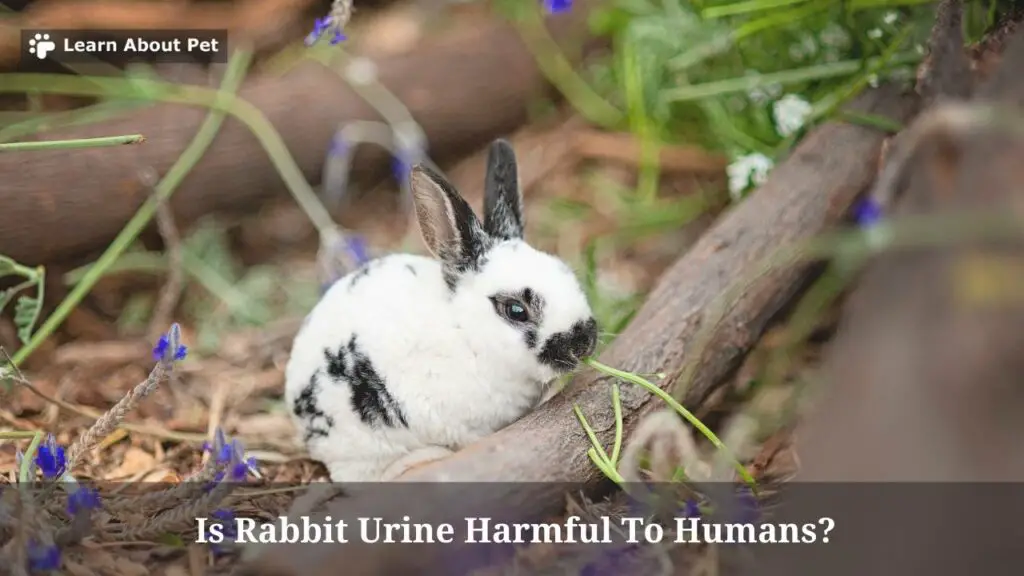
And the answer is that overexposure to such ammonia can indeed make you ill. That would be by way of the ammonia irritating your respiratory tract.
But it takes a great deal of exposure to the ammonia (and for very long), for that to happen.
Nonetheless, if you were wondering, is it bad to breathe in rabbit urine, that is the potential risk.
And if you were wondering, how can rabbit urine make you sick, those are the mechanisms. So it is through the E. cuniculi infection, respiratory irritation (due to the ammonia) or food/water contamination by the rabbit urine.
Before proceeding further though, it would be a good idea for us to first pause, and try to find out how humans get into contact with the rabbit urine.
After that, we can revert to answering the how is rabbit pee harmful to humans question.
How Do Humans Get Into Contact With Rabbit Urine?
There are several ways in which humans get into contact with rabbit urine.
Firstly, people who keep rabbits as pets may come into contact with the rabbit urine while cleaning the rabbit cages.
Secondly, when people are handling and petting the rabbits they keep, they may come into contact with the rabbits’ pee.
Thirdly, if proper standards of hygiene are not maintained, the rabbit pee can somehow get into contact with human food. The rabbit pee can then contaminate the human food.
Fourthly, people who happen to be around the cages where rabbits are kept may breathe in the ammonia from the rabbit pee…
Worth of special note is the phenomenon in which rabbits sometimes pee – almost deliberately – on humans. This leads to a question: why do rabbits pee on humans?
And the answer is that the rabbits may pee on humans as a way of ‘marking’ them. That is in order to tell other rabbits that may be around that they (the ones that peed on the humans) ‘own’ those humans.
The peeing can also be a show of affection. Just as rabbits that are in love with other rabbits may pee on them as a sign of affection. So do they sometimes pee on their human caregivers…
Nonetheless, this is yet another way in which humans may come into contact with rabbit urine.
Is Rabbit Urine Harmful To Humans?
This question, on whether rabbit urine is harmful to humans, is one that comes up in rabbit forums frequently. It is a derivative of the broader question, in which people seek to know, is rabbit poop and urine harmful to humans?
But focus here is specifically on the rabbit urine. So people seek to know, is rabbit urine bad for your health? And if yes, how exactly is rabbit harmful to humans?
What diseases can humans get from rabbits urine? And regarding the notoriously pungent rabbit pee smell: is the smell of rabbit urine harmful to humans?
But we need to start with the aspect of whether rabbit urine can cause diseases to humans. The first question in that context is this: do rabbits carry disease harmful to humans?
And the answer is yes. Rabbits do carry diseases that can affect humans. But most of those are diseases that a human can only get if a rabbit bites them. Or if their food gets contaminated with rabbit waste…
With regard to rabbit urine specifically, contact with it tends not to be particularly harmful for healthy humans. In this context, healthy humans are those whose immunity systems are functioning as they should.
So unless one’s immunity has problems, it is unlikely that rabbit urine will harm them.
But if one’s immunity has problems, they may get infections like Encephalitozoon cuniculi from exposure to rabbit urine.
And for all people, overexposure to the smell from rabbit urine can cause respiratory irritations.
At yet another level, if rabbit urine contaminates human food, this can be catastrophic. In that case, the people who eat such food can become seriously ill, due to the pathogens in the urine.
How Can Rabbit Urine Make You Sick?
There are three key ways in which rabbit urine may make you sick.
Firstly, if your immunity is not good, and you get into contact with rabbit urine, you may contract Encephalitozoon cuniculi. This is fungus (previously regarded as protozoa) that can cause central nervous system and kidney issues.
Secondly, overexposure to the ammonia from rabbit urine may cause you to have respiratory irritation.
Thirdly, if rabbit urine finds its way into your food or water, it can cause serious gastrointestinal problems. And the infections that start this way may, without treatment, become systemic: affecting the whole body.
So those are the ways in which rabbit urine can make you sick.
In the case of Encephalitozoon cuniculi, you only need to get in physical contact with the urine, to be infected.
And in the case of respiratory irritation, you only need to breathe in the ammonia from rabbit urine for too long, to be affected.
In the case of gastrointestinal problems, the rabbit urine needs to get into your food or water. Only then would there be contamination, leading to illness.
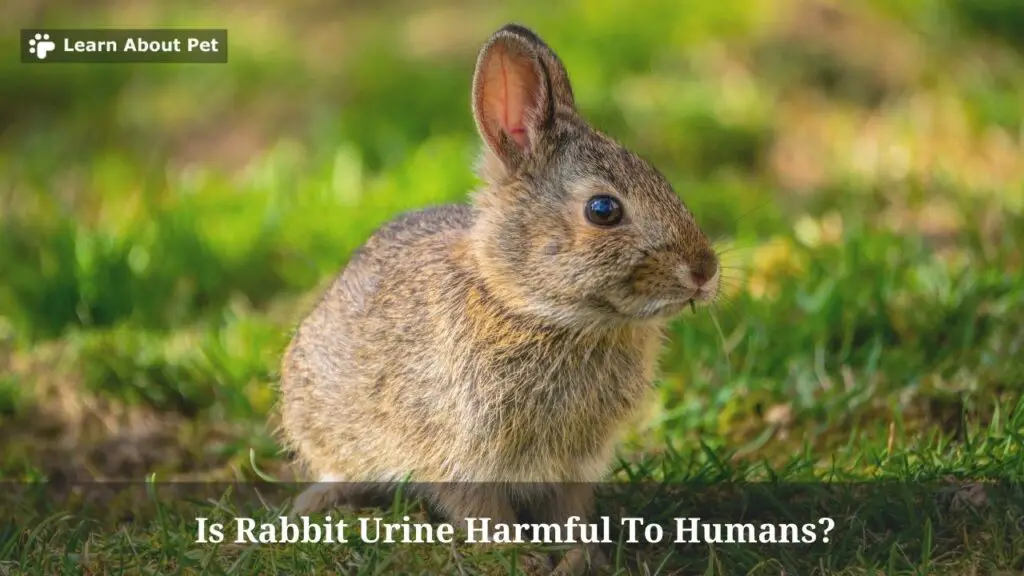
What Diseases Can Humans Get From Rabbits Urine?
One disease that humans can get from rabbits urine is Encephalitozoon cuniculi infection.
Another disease that humans may get from rabbits urine (specifically the urine’s ammonia component) is respiratory irritation.
Yet another disease that humans may get from rabbits urine is gastrointestinal infection. This can only happen if they get to eat food contaminated with rabbit urine.
Usually, the rabbit itself will need to be sick (or at least passively carrying the pathogen) before it can pass the same to you through its urine.
Thus if your rabbit is healthy, it is unlikely to make you sick. How do you know if your rabbit is healthy? This may be by examining it physically, having it tested or even by checking things like its urine.
So, for instance, you can pay attention to what rabbit pee tells you about a rabbit’s health. Look at things like the rabbit urine color and consistency.
If, for instance, you find rabbit urine milky yellow, this tells you something about the rabbit’s health. If you just find rabbit pee milky color being present, you can also make an inference on the rabbit’s health.
Ultimately, if a rabbit has a certain pathogen (like Encephalitozoon cuniculi), it may be able to pass the same to you through its urine.
The diseases that humans can get from rabbit urine include Encephalitozoon cuniculi infection, respiratory irritation and gastrointestinal infection. Let’s look at each in turn briefly.
E Cuniculi As An Infection Humans Can Get From Rabbit Urine
Encephalitozoon cuniculi (E. Cuniculi in short) is an infection that can cause kidney and central nervous system problems.
If a person has poor immunity, and they get into contact with infected rabbit urine, they are at risk of catching this disease.
Thus for people who have poor immunity, it is best to avoid contact with rabbit urine.
And if you research on the is rabbit urine harmful to humans subject, you will see that this aspect (of the urine possibly causing E. cuniculi infection) is a big deal.
Respiratory Irritation As A Disease Humans Can Get From Rabbit Urine
Rabbit urine tends to be very pungent, on account of its rather high ammonia level. And overexposure to ammonia can cause respiratory irritation in people.
Therefore people who are exposed to rabbit urine may end up developing respiratory infection in this way.
But it would take exposure to very much rabbit urine (as in a rabbit farm for instance) and for very long for this sort of irritation to manifest.
Gastrointestinal Infection As A Disease Humans Can Get From Rabbit Urine?
If rabbit urine somehow finds its way into human food or drinking water, it can cause many problems.
The pathogens in the rabbit urine may cause very bad gastrointestinal infections.
Those gastrointestinal infections may then become systemic, in which case they can even be fatal.
Thus in answering the is rabbit urine harmful to humans question, we do have to touch on this dimension too.
Rabbit Urine Safety Precautions You Need To Take
There are several safety precautions that you can take, with regard to rabbit urine.
Whenever people hear of precautions, they think that whatever the precautions are being set against must be toxic. But that is not always the case.
Is rabbit urine toxic? No. But, as we have seen, there are several ways in which it can cause problems.
Thus one key precaution to take is that of ensuring the urine doesn’t get into human food or drinking water. If it does, it can cause very serious gastrointestinal infections.
Another key precaution is to ensure that you clean the rabbit urine well. This is in order to stop it from smelling, because strong ammonia smell can cause respiratory irritation.
How do you stop rabbit urine smell? This is mainly by cleaning it well. And how do you clean rabbit pee in such a manner that it doesn’t smell? This is mainly by using special cleaning agents such as baking soda and vinegar.
You can collect the rabbit urine (after cleaning it off) and make use of it in the relevant ways. How is rabbit urine useful? That is mainly as an organic manure, which can promote the growth of garden plants greatly.
But with regard to rabbit urine safety precautions, you need to ensure that you clean the urine regularly and thoroughly.
Yet another rabbit urine safety precaution: ensure that people whose immunities are poor don’t get into contact with it. If they do, they would be at risk of contracting Encephalitozoon cuniculi.
Final Verdict – Is Rabbit Urine Harmful To Humans
Normally, contact with rabbit urine isn’t harmful to humans whose immunity systems are working properly.
But if it does get into human food or drinking water, the rabbit urine can cause bad contamination. It can make the people who eat such food or drink such water sick.
Furthermore, overexposure to rabbit urine ‘s pungent ammonia smell may cause respiratory irritation.
And for people whose immunity is poor, coming into contact with rabbit urine can cause infections like Encephalitozoon cuniculi. Those can in turn lead to kidney and central nervous system problems.
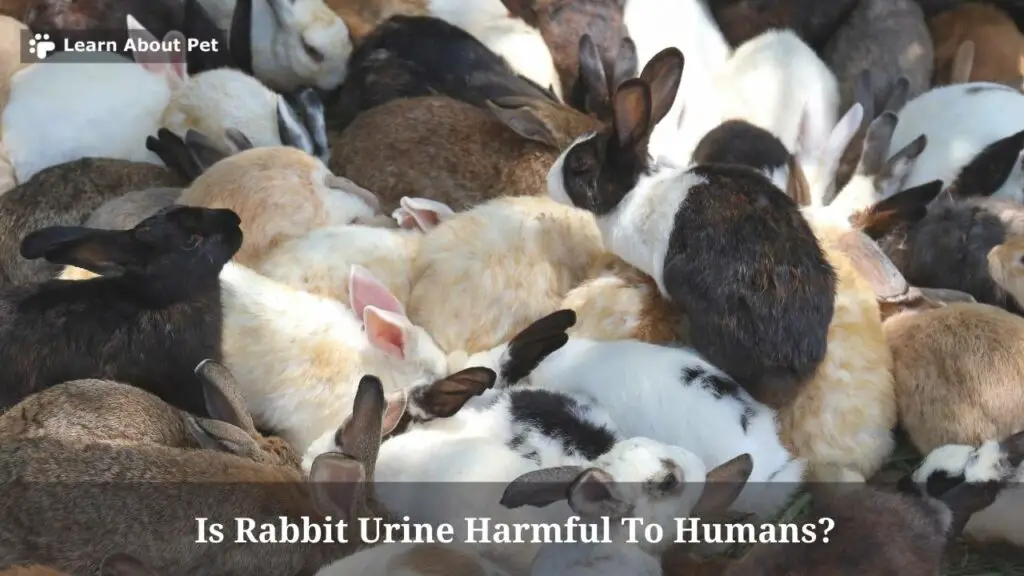
It is best to clean rabbit urine properly, using cleaning agents like baking soda and vinegar, so that it doesn’t smell.
You also need to take every caution to ensure that rabbit urine doesn’t contaminate human food or drinking water.
And you need to ensure that people with poor immunity don’t get into contact with rabbit urine. If they do, they may contract a nasty condition like Encephalitozoon cuniculi.
As a pet lover, make sure to learn about pet more and give your pet rabbit a good and comfortable life!

Welcome to Learn About Pet. My name is Rajkumar Ravichandran and I love all pets, travel, and amazing food. I write about my passion and personal experience caring for multiple pets in this blog! ❤️
Post Disclaimer
DISCLAIMER: THIS BLOG OR WEBSITE, "Learn About Pet", DOES NOT PROVIDE YOU WITH MEDICAL ADVICE AND IS NOT A SUBSTITUTE FOR MEDICAL ADVICE. ALWAYS GET IN TOUCH WITH YOUR PERSONAL VETERINARIAN AND USE INFORMATION HERE AS GENERAL ADVICE.
The information, including but not limited to, text, graphics, images and other material contained on this website are for informational purposes only. No material on this site is intended to be a substitute for professional veterinary advice, food recommendation, diagnosis, or treatment. Always seek the advice of your veterinarian or other qualified health care provider with any questions you may have regarding a medical condition or for pet food related questions.



